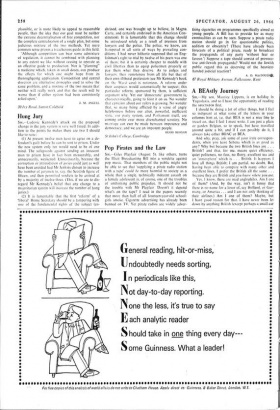Pop Pirates and the Law
SIR,—Giles Playfair (August 5), like others, turns the Illicit Broadcasting Bill into a vendetta against pop music. That members of the public might not be able to see that 'supplying a pirate radio station with a tape' could be more harmful to society as a whole than a single, technically indecent assault on a female adolescent is, of course, one of the troubles of unthinking public prejudice. It should not be the trouble with Mr Playfair. Doesn't it depend what's on the tape? I read in the papers recently that more than half of all fourteen-year-old school- girls smoke. Cigarette advertising has already been banned on TV. Yet pirate radios are widely adver-
thing cigarettes on programmes specifically aimed at young people. A Bill has to provide for as many eventualities as can be seen. Suppose a pirate radio station should go in for questionable politics, sedition or obscenity? (There have already been forecasts of a political pirate, ready to broadcast the propaganda of any party 'without fear or favour.') Suppose a tape should consist of provoca- tive anti-Jewish propaganda? Would not the Jewish public regard this as deserving of the heaviest- handed judicial reaction?






























 Previous page
Previous page